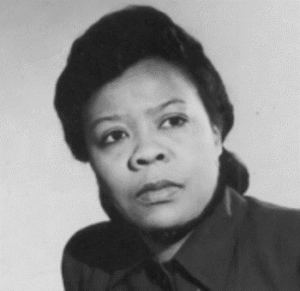
Bessie Blount, France (1951)
On this date, we mark the birth of Bessie Blount, a Black inventor and forensic scientist, in 1914.
She was born in Hickory, Virginia, the daughter of William and Mary Blount. Little else is known of her family or childhood except that she had long wanted to work in medicine. Blount left home and traveled north to New Jersey to become a physical therapist. She studied at both Panzar College of Physical Education and Union Junior College. Then, she moved to Chicago, where she finished her training.
After graduating, she began working with injured World War II amputees. The war had left many severely disabled, and her work was in great demand. While working with amputees, she began developing devices to assist her patients in regaining their independence. By 1951, Blount was living in Newark, N.J., teaching physical therapy at the Bronx Hospital in New York.
Eating was a great challenge for many of the handicapped people she worked with. She taught people to do the work that their feet and hands once did. She invented a device that delivered food through a tube, one bite at a time, to a mouthpiece that could be used whether the patient was sitting up or lying down. When the person wanted more food, they bit down on the tube, and it signaled a machine to send the next morsel. On April 24, 1951, she received her patent.
This electric self-feeding device was eventually donated to France. In 1951, she patented a simpler device called a "portable receptacle support, " allowing people to feed themselves. It used a brace around the neck to support a bowl, cup, or dish. Blount also appeared on the Philadelphia television show “The Big Idea” in 1953, Becoming the first Black and the first woman to be given such recognition.
While her inventions could revolutionize many people's lives, getting them patented and marketed for patients was difficult in the United States. Frustrated by the lack of interest by the American Veteran’s Administration, Blount signed the rights to her other inventions over to the French government, stating that she had proven "that a Black woman can invent something for the benefit of humankind.”
Around this time, she became a close friend of Theodore M. Edison, the son of Thomas Alva Edison, who invented the electric light. She cared for Mrs. Edison’s mother in East Orange, N.J. Blount, and Theodore Edison held many in-depth scientific and other midnight conversations. The two also shared the development of ideas for his company.
Blount is also the inventor of the disposable cardboard emesis basin. She designed this from old newspapers, cake flour, and water, shaping it and baking it in her oven. Again, the American Veteran's Administration Hospital wasn’t willing to use her invention, which was never patented in America. These (now slightly modified in design) basins are currently used throughout Belgium. American hospitals still use the old standard kidney-shaped basins of 1913.
Many of Blount’s trail-blazing efforts and inventions made the lives of everyone safer from disease and, since World War II, have been influential in helping disabled military personnel gain independence.
In 1969, Blount began a career in forensic science with law enforcement, including the departments in Vineland, N.J., and Norfolk and Portsmouth, VA, becoming, by 1972, the chief document examiner for their laboratories.
In 1977, Blount became the first Black woman to train and work at Scotland Yard after J. Edgar Hoover, FBI director, turned down her application. A religious woman motivated by personal drive and the inspiration of inventor Louis Latimer and others, Blount still ran her own business at 83. She used much of her forensic training to examine and research the authenticity of Black slave “papers” and pre-Civil War documents. Blount worked with material from Native-American treaties made with the United States. She also served as a consultant in “special investigations” for many law enforcement agencies while being a member of the South Jersey Chapter.
In 2007, Blount was inducted into New Jersey's Cumberland County Black Hall of Fame. She was also honored with the state's Joint Legislative Commendation. Bessie Blount died in Newfield, New Jersey, on December 30, 2009.
Bessie Blount
personal letters to African American Registry
PO Box 19441
Minneapolis, MN 55419